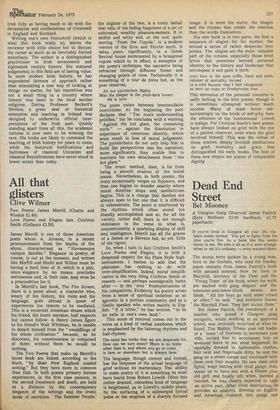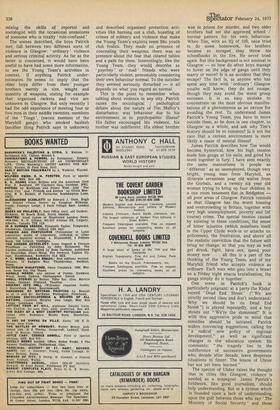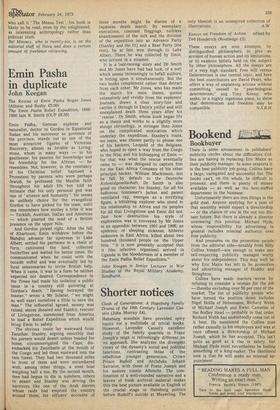Dead End Street
Be! Mooney
A Glasgow Gang Observed James Patrick (Eyre Methuen 0.95 hardback; £1.75 paperback)
If you've lived in Glasgow all your life, violence seems normal. You get in fights from the time you're five. So a book like this seems funny to me. He tells it all as if it were strange, when to me it's ordinary — even watered-down.
The words were spoken by a young man, born in the Gorbals, who read the Sunday paper extracts from James Patrick's book with amused interest. Now he lives in Maryhill, territory of the Fleet and the 'Young Team' of the book, where the walls are daubed with gang slogans and the tenement-and-tower-block streets are bleak. "All the boys go with some crowd or other," he said, "and. everyone knows the Maryhill Fleet. They just accept them."
But James Patrick, the pseudonym of a teacher who joined a Glasgow gang incognito, whilst working in an approved school, was obviously surprised at what he found. Tim Malloy, fifteen year old leader of a 'team ' of fourteen to seventeen year olds, invited him to accompany him on weekend leave to see what happened. So carefully dressed in fashionable clothes, hair neat and fingernails dirty, he met the gang on a street corner and continued with them over four months. He saw them pick fights, wage battles with rival gangs, stab, queue up to have sex with a fifteen year old girl; and finally left when, handed a hatchet, he was clearly expected to take an active part. After vivid description, he provides an analysis, drawing on English and American research into gangs and mixing the skills of reporter and sociologist with the occasional uneasiness of someone who is totally 'role-confused,' The scenes described, the boys Patrick met, fall between two different sorts of violence in Glasgow: ' ordinary ' violence and serious criminal activity. As far as the latter is concerned, it would have been useful to have had some more information, to see the Young Team's activities in context. If anything Patrick underestimates. He seems to imply that the older boys differ from their younger brothers merely in size, weight and quantity of weapons, stating for example that organised rackets and vice are unknown in Glasgow. But only recently I had the odd experience of meeting four or five men in their middle twenties, members of the ' Tongs ', (sworn enemies of the Maryhill gangs) who smoked hashish (another thing Patrick says is unknown) and described organised protection activities like burning out a club, boasting of crimes of robbery and violence that make the Young Team's exploits seem like youth club frolics. They made no pretence of concealing their weapons; there was no pretence about the fear that cleared tables and a path for them. Interestingly, like the Young Team, they would describe as ' psychey ' or ' mad ' friends who were particularly violent, presumably considering their own behaviour normal. To the outsider they seemed seriously disturbed — it all depends on what you regard as normal.
This is the point to remember when talking about violence in any city. Patrick raises the sociological / pathological debate about the nature of Tim Malloy's disturbance: was behaviour due to his environment or to psychopathic illness? His father encouraged his violence, his mother was indifferent. His eldest brother was in prison for murder, and two older brothers had set the approved school / borstal pattern for his own behaviour. When Tim, with an IQ of 105, once tried to do some homework, his brothers became so enraged they threw his schoolbooks in the fire. He never tried again. But this background is not unusual in Glasgow — so how do other boys manage to hover on the edge of gangs until they marry or move? Is it an accident that they escape? The fact is, as anyone who has spent any time with ' ordinary ' Glasgow youths will know, they do not escape, though they may avoid the worst group excesses. It is an easy mistake to concentrate on the most obvious manifestations of a phenomenon as an excuse for avoiding the rest. To understand James Patrick's Young Team, you have to move outside them, as he does in one chapter, to Glasgow as a whole, and ask why Tim's history should be so common? Is it not the case that a certain environment is more likely a cause of mental illness?
James Patrick describes how Tim would become hysterical, how his high tension made him gouge at his nails, and grind his teeth together in fury. I have seen exactly the same mannerisms in people as 'different' as an unemployed, though very bright, young man from Maryhill, an illiterate seventeen year old waiter from the Gorbals, and a twenty six year old woman trying to bring up four children in a one room tenement flat in Bridgeton — all poor areas of Glasgow. Patrick reminds us that Glasgow has the worst housing and overcrowding in Britain, together with very high unemployment, poverty and (of course) crime. The special tension caused by existing in these conditions, the sense of bitter injustice (which manifests itself in the Upper Clyde work-in or attacks on policemen), the frustration, and above all the realistic conviction that the future will bring no change, so that you may as well get drunk, fight, have sex, spend, your money now . . . all this is a part of the thinking of the Young Team, and of my Maryhill friend who accepts violence as ordinary. Each man who gets into a brawl on a Friday night enacts brutalisation; the gangs simply do it together.
One scene in Patrick's book is particularly poignant: at a party the Kinks' record 'Dead End Street' (" We are strictly second class and don't understand/ Why we should be on Dead End Street ") is played repeatedly, and a boy shouts out " We're the slummies!" It is with this aggressive pride 'in mind that remedies should be initiated. Patrick makes convincing suggestions, calling for "a radical new policy of regional development," as well as significant changes in the education system. He comments: "the tragedy lies in the indifference of successive governments who, decade after decade, leave desperate situations to fester. The lesson of Ulster has not yet been learned."
The spectre of Ulster raises the thought that in cities like Glasgow, violence is needed as a scapegoat. James Patrick's fieldwork, like good journalism, should help understanding. But in a system which is founded upon a lack of understanding, upon the gulf between those who say 'The Ministry of Social Security' and those who call it 'The Means Test ', his book is likely to be read, even by the enlightened, as interesting anthropology rather than political truth.
Bel Mooney, who is twenty-six, is on the editorial staff of Nova and does a certain amount of freelance reviewing.




































 Previous page
Previous page